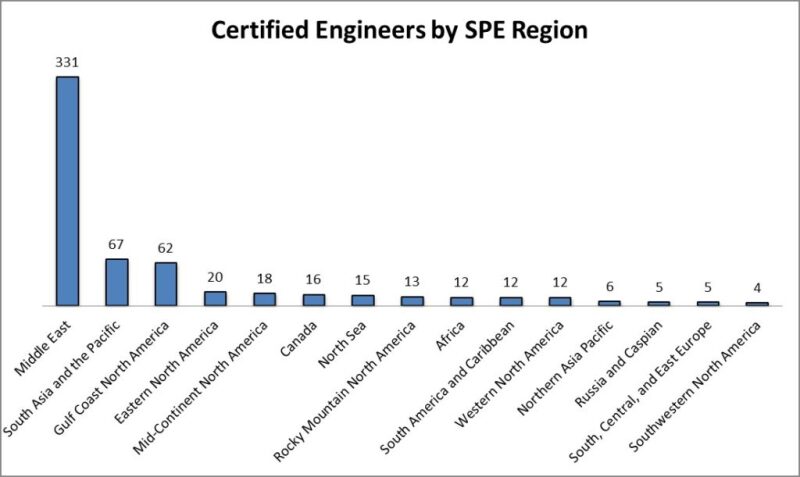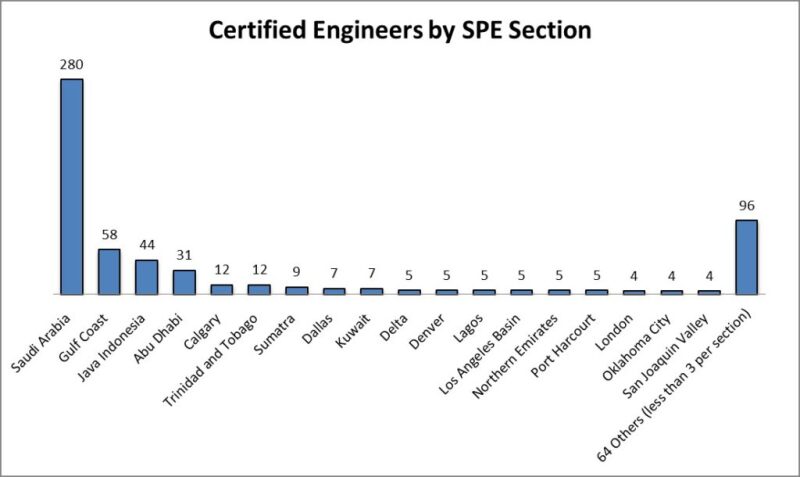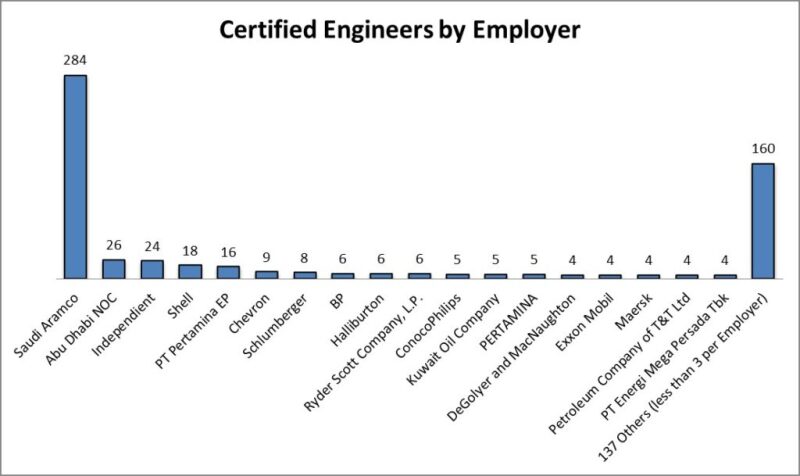The petroleum industry is constantly evolving, with niche expertise and highly specialized skill sets required to drive the technology development and performance improvements of energy projects on a meaningful scale. As the industry takes on more complex projects, it will continue to rely on a globally mobile and competent workforce to seek out innovative solutions to current and future challenges. In the midst of these changes, core engineering knowledge and understanding of foundational petroleum sciences remain as relevant today as they were among the previous generations.
To ensure a high level of technical competence is maintained within the oil and gas sector, a globally consistent evaluation approach is necessary. Industry certification is a proven method for validating the technical knowledge of professionals against a structured and well-defined competency curriculum. For this reason, SPE has implemented the petroleum engineering certification.
The SPE Certification (SPEC) was originally intended to provide an international credential to petroleum engineers practicing in countries where a national or state-based engineering licensing body has not yet been established. Since its inception, SPEC has become a highly sought-after qualification offering a myriad of benefits to certified engineers and their employers.
The advantages of obtaining the certification include
- Receiving an internationally recognized badge of technical knowledge, benchmarked and transferable with standards applicable in other parts of the world
- Being recognized by the community, industry, and governments as a professional and responsible contributor to the industry
- Demonstrating engineering technical knowledge and commitment to professionalism, which have been formally assessed
- Proving commitment to excellence and learning through continued professional development
- Being more employable and improving options for career growth
- Having access to a network of similarly qualified and experienced experts
- Gaining greater confidence from your employer in your ability to take on increasing levels of responsibility, and the assurance that you have at least the basic skill set for a particular area of practice
The upside of becoming a certified engineer extends beyond the act of earning a formal qualification; the journey undertaken to attain the certification also offers significant personal merits. Regardless of the end result, the certification process provides a rewarding challenge that will help enhance the applicants’ knowledge base, and demonstrate their commitment to a high standard of professionalism.
Background and Details
It is important to acknowledge that SPEC is an internationally recognized credential, and not a license or charter. However, people who have previously passed a written competency exam and obtained a state-based Professional Engineer (PE) license, for instance, in the US or Canada, can apply for a waiver through SPE to obtain the SPEC. In the US, graduates from universities not endorsed by the Accreditation Board for Engineering and Technology, who cannot acquire the US PE license, can also opt for the SPEC.
Although the engineering license and certification are sometimes used interchangeably, there is a key difference between these terms. While both credentials stipulate minimum criteria with respect to experience level, training, and testing requirements, the main difference is that certification is generally voluntary whereas licensing is mandated by law, for instance, in countries where a complete knowledge of engineering codes and safety standards is a legal requirement in certain positions.

The SPEC is internally promoted by a number of prominent national and international oil companies. These organizations offer incentives to engineers to go through the SPEC assessment process. As of March this year, nearly 600 professionals have obtained the certification, representing 155 companies and 15 geographical regions. Figs. 1–3 illustrate trends in the current number of SPE certified engineers, their professional affiliation, and geographical region.


There are pre-requisites specified by SPE that must be fulfilled by candidates looking to earn the SPEC: Applicants must have an undergraduate degree in petroleum engineering or a closely related field, at least 4 years of relevant work experience, and registered professional membership with SPE. Once these requirements have been met, the candidates may be required to undertake a written examination. The exam is designed to be completed over 7 hours, and consists of 70 multiple choice questions, each relating to one of the three main areas of petroleum engineering practice:
- Drilling, 25%
- Production engineering, 35%
- Reservoir, 40%
How To Prepare for the Exam
SPEC is a well-regarded credential of technical knowledge as demonstrated by passing a rigorous and thorough examination. This formal approach to evaluating the candidates’ engineering proficiency is considered the most reliable form of assessment as it adheres to a universal set of standards.
To support candidates through the process of obtaining the certification, SPE offers several resources and structured training sessions. Candidates can prepare for the certification exam by attending optional review courses in person at SPE training centres around the world. A 2-day review course is also offered at the SPE Annual Technical Conference and Exhibition each year. Preparatory study courses will share best practices and introduce the applicants to the scope and breadth of knowledge to be assessed. Questions similar to those found on a typical exam are reviewed to familiarize the participants with the content.
SPE provides the preparatory courses online, and members can also register for one of the many webinars SPE offers to gain greater understanding of different engineering subdisciplines. A range of other resources including certification FAQs and the exam specifications can also be accessed on the SPE website.
Since 2015, the SPEC exam has been offered in a computer-based format. Candidates can pick a location and date convenient to them, register on the SPE website, receive a voucher online, and take it to the assessment center on the scheduled exam day. To keep the certification renewed, 16 hours of continued professional development in addition to a small annual renewal fee are required.
Benefits of Being Certified
Like a lawyer passing a bar exam or a doctor becoming board-certified, certified engineers formally earn the “rite of passage” to apply their academic insight to real-world challenges with confidence. For a professional looking to pursue a technical career path, obtaining a formal certification is arguably as crucial as earning a university degree, providing the final cap on his/her academic education.
The importance of certification is acknowledged by young professionals (YPs) around the world. Bruno Rivas, a petroleum engineer at Chevron based in Mexico City, and an author of this article, believes that the SPEC is important to YPs because it presents an extra tool to continue growing their capabilities and demonstrating their technical proficiency. “It is also greatly valuable in our industry because no matter where you apply for a job, SPEC is an international certification supported by the one of the largest and most prestigious societies of engineers: The SPE.”
Another author, Yogashri Pradhan, a production engineer at Texas Oil and Gas Institute, shares a similar view: “SPE Petroleum Engineering Certification is beneficial for members with any amount of experience in the oil and gas industry. The exam covers a wide range of competencies, making this certification applicable to various petroleum subdisciplines and job functions. The preparation required for the exam is applicable to continuing education as well as other certifications, such as the US PE license exam, as the same references and learning resources offered by SPE are also useful for the PE exam. Even with 4 years of work experience required for SPEC, younger members will learn plenty during the process of obtaining this certification and increase the number of opportunities available to them.”
Chris Fancher, a drilling engineer at Chevron, and an SPE-certified petroleum engineer, agrees.
There are tangible benefits to earning the SPE Certification. It shows commitment, capability, and credibility, and can definitely set you apart from other candidates when it comes to applying for jobs or transferring to a new team within the same company.
Engagement of competent professionals at all levels of an organization is critical to ensure the optimal performance and safe execution of projects. SPEC provides a formal endorsement of an engineer’s technical skills and capabilities by a global organization that extends to anywhere you may travel or work—a highly desirable benefit given the global nature of oil and gas operations. The motivation and effort toward obtaining the certification also demonstrates a continuing commitment to the profession and your individual professional growth, which are key leadership attributes.

